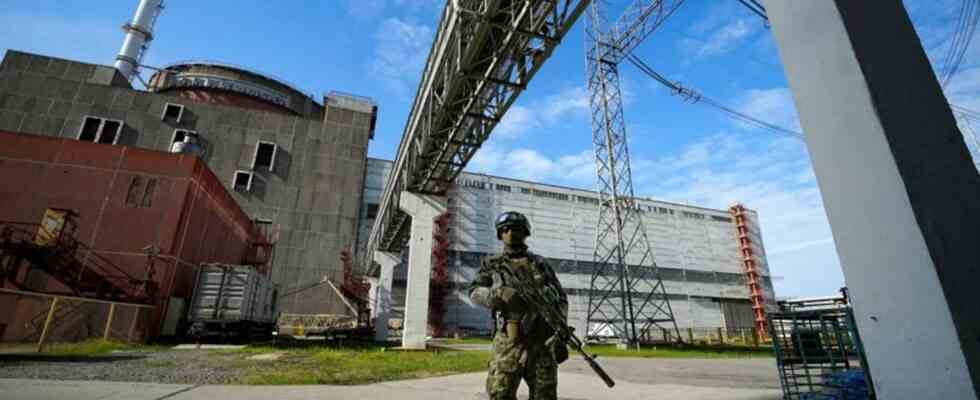Zaporizhia
Moscow rejects G7 demand for handover of nuclear power plant
A Russian soldier guards an area of the Zaporizhia nuclear power plant. The photo
© -/AP/dpa
The situation at the Ukrainian nuclear power plant Zaporizhia is extremely dangerous because of the ongoing shelling. Now the UN Security Council has also gotten involved – Moscow has announced that it wants to cooperate.
Russian leaders have rejected the G7’s call for the Zaporizhia nuclear power plant to be handed over to Ukraine. According to the Interfax agency, Konstantin Kosatschow, deputy head of the Russian upper house of parliament, answered the question of a possible return of the nuclear power plant “No and no again” on Friday. He justified this with security concerns.
In order to ensure the safety of the nuclear power plant, full control over the plant is required. “The Ukrainian authorities, by definition, cannot do this under the conditions of the special military operation,” said the prominent Russian foreign policymaker.
In view of the ongoing shelling, Moscow has indicated that it will agree to a withdrawal of its military there. “That’s a reasonable demand for the demilitarization of the Zaporizhia nuclear power plant, I think we’ll support it,” said the deputy head of the foreign affairs committee in the Russian parliament, Vladimir Dschabarov, according to the Interfax agency on Friday. However, Moscow wants to retain control of the nuclear power plant.
Dschabarow ruled out handing over the most powerful nuclear power plant in Europe to Ukraine. “Russia must retain control of the plant,” stressed the Duma deputy from the Kremlin party United Russia.
Atomic Energy Agency: nuclear power plant no security risk
According to the International Atomic Energy Agency (IAEA), the Ukrainian nuclear power plant Zaporizhia, which is under constant fire, is currently not a security risk. “IAEA experts have provisionally determined that there is no immediate security threat as a result of the shelling or other military action. However, this may change at any time,” said IAEA chief Rafael Grossi at an emergency UN Security Council meeting in New York.
Just a few hours before the session of the most powerful UN body requested by Russia, Europe’s largest nuclear power plant came under fire again. Zaporizhia was attacked with heavy artillery and rocket launchers, a representative of the Russian occupation authorities, Vladimir Rogov, said on the Telegram news channel. Shots are fired from towns under Ukrainian control. The Ukrainian company Enerhoatom reported ten impacts in the vicinity. The information could not be verified. Earlier, Ukraine had accused Russia of targeting the nuclear power plant.
Experts should get a picture of the situation
Before the Security Council, Grossi called on Moscow and Kyiv to quickly allow international experts to visit. “Personally, I am ready to lead such a mission.” Important facts could not be gathered without the physical presence of representatives of the International Atomic Energy Agency. The United States is also pushing for a trip by experts: “This visit can’t wait any longer,” said US Undersecretary for Arms Control Bonnie Jenkins.
Russia’s UN ambassador Wassili Nebensja promised Moscow’s cooperation: “We are ready to provide any support we can get in solving organizational matters.” A visit should ideally take place in August. After the meeting, Nebensia emphasized that no country on the 15-member Security Council blamed Russia for the shelling of the nuclear power plant.
UN Secretary-General António Guterres had previously warned of a new nuclear catastrophe and expressed his deep concern: “Unfortunately, there has been no de-escalation in the last few days, but reports of other deeply worrying incidents. If these continue, this could lead to a catastrophe. ” He appealed to both warring parties to stop military activities immediately. The worst nuclear accident on European soil occurred in the Ukrainian Chernobyl nuclear power plant in 1986. The Russian war against the neighboring country has now lasted more than five and a half months.
UN spokesman: “Nuclear power plant in the middle of a battlefield”
It was unclear whether a group of UN experts could be sent to the nuclear power plant. “We are talking about a nuclear power plant in the middle of a battlefield,” said UN spokesman Stephane Dujarric. This raises enormous security concerns for United Nations employees.
According to the operator Enerhoatom, the situation in the power plant is “under control”. The radioactivity is no higher than usual. The nuclear power plant had already been fired at and damaged by rockets over the weekend. Ukraine accuses Russian troops of using the nuclear power plant as a fortress for attacks. The pro-Russian separatists, in turn, accuse Ukraine of wanting to persuade the West to intervene by shelling the power plant. Rogov rejected calls by the group of seven leading industrialized nations (G7) – including Germany – to return the power plant to Ukrainian control. “It would be like putting a hand grenade in a monkey’s hand,” he wrote.
Federal government concerned about battles over nuclear power plants
The German government has expressed concern about the ongoing fighting in the area around Ukraine’s Zaporizhia nuclear power plant. “Of course, the federal government is concerned about the information that has reached us from Ukraine on this subject, about the fighting taking place around the nuclear power plant,” said government spokesman Steffen Hebestreit in Berlin on Friday. The federal government has repeatedly made it clear “that we are calling on all sides to stop this highly dangerous shelling,” Hebestreit explained. This was also the case last Wednesday at the meeting of the G7 foreign ministers.

